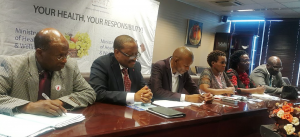Last mile towards dual elimination of Mother-to-Child Transmission of HIV and Syphilis: Can Botswana be the first?
Gaborone, Botswana - 19 February 2019: The Ministry of Health and Wellness (MoHW) requested for technical support from WHO, UNICEF, UNAIDS and CDC to review data processes and assist the country in determining the best modalities for data quality improvement and priority actions for the country to progress toward the path to elimination.
The PMTCT/Syphilis data is collected from service delivery sites (health facilities) on a paper based system and summarized on monthly data collection forms. Data is then aggregated and entered into the DHIS2 electronic system at DHMT level and transmitted through the system to the national level for analysis and feedback. The verification exercise showed varying data at different levels of reporting (facility to District) caused among others by information that is recorded or updated after the reports have been submitted. On the other hand, data on syphilis is recorded at facility level but is not reported at national level, despite a good strategy for syphilis prevention among pregnant women, integrated within the antenatal care programme and other SRH services. There is a need to streamline syphilis data and implement monthly aggregate reporting together with HIV among pregnant women.
In order to address the above issues, missions to Botswana were convened, which recommend that the ministry should maintain momentum and commitment to Elimination of mother-to-child transmission in Botswana and to invest more in data management including capacity building for national and district Monitoring & Evaluation officers and programme managers on data analysis and utilization.
In addition, other key issues to be addressed were the use of standard indicator definitions for tracking and reporting programme coverage especially on the area of EID, lack of system to routinely and systematically report retention in care for women when they exit or graduate from PMTCT program. A special emphasis was put on congenital syphilis elimination in Botswana.
The Ministry was advised to put a lot of effort in reducing the turn-around time for laboratory results for infant testing by considering use of technology for quick feedback from laboratories and to clinics.
External team from WHO AFRO, HQ with UNICEF, UNAIDS and CDC committed to support Botswana and wished that the country could be the first to be validated in African region to ascertain the path to elimination, based on the strong country PMTCT program as well as its good progress towards Universal Health Coverage.
In addition, the team recommended primary prevention through strengthening of family planning with focus on adolescents and youth to minimize incident infection during pregnancy and breastfeeding.
During the debriefing of the ministry management, Ms Ruth Maphorisa the Permanent Secretary, thanked the team for the support they have provided to the ministry. She emphasised the need to sustain high quality work to avoid stagnation. She acknowledged that the last mile to achievement of program results can be very difficult and requires innovative ideas. She informed the meeting that the government is committed to the elimination process and will endeavour to tease out and implement tasks that will enable the country to eliminate MTCT. She also informed the mission team that the MoHW is undergoing restructuring and that there is need to manage the process such that it does not destabilize program implementation. She pleaded for continued support to the program from the UN and partners.





